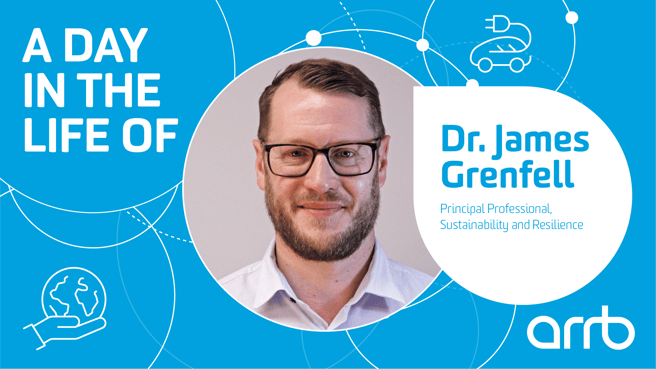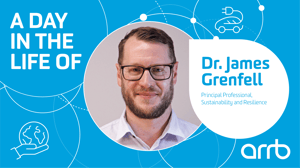This month we're giving you an insight into what life at ARRB is like.
We will be covering the stories of several ARRB employees in the different Strategic Working Groups. Next up, we have Dr James Grenfell from our Sustainability & Resilience team.

What does a day in your life look like?
I normally wake up around 7am, dependent on what time the little person wakes. I start off with a coffee and bowl of Weetbix. If I am out of bed early enough, I'll watch the BBC News.
A relatively short cycle along the Yarra to the office kicks off the working day. I get going by checking for anything urgent in emails with another coffee.
Then it's onto project work. A lot of work is to be done in the area of recycled materials presently. Major projects involve the use of waste plastics and crushed recycled glass in road infrastructure. Specifications and guidelines on usage to be developed. There is also plenty to be done in the space of emerging technologies. Bottom ash from energy from waste plants is on the agenda and we are in the process of developing proposals.
Lunch breaks up the working day, as do conversations with work colleagues (both technical and non-technical – many people at ARRB will have cottoned on to the fact that I am a bit of a sports fanatic).
Relationships are being developed in the local government space. Projects are underway involving field trials to demonstrate the performance of recycled materials solutions. The network of local government contacts is always growing. This can work two ways, with the possibilities to undertake work to offer advice on recycled materials usage, but also getting feedback on how novel and recycled treatments have performed to help understand best practice.
The end of the working day means another short cycle home whereupon it is dinner time and the little person's bedtime routine.
In the evening, I take in the nostalgia of British detective shows, or if I am lucky, watching a Big Bash game. Sometimes I also use my evenings to catch up with a few work items, to ensure things are still on track.
Eventually it's bedtime and then repeat the process until the weekend, however a trip to the ALF (Accelerated Loading Facility) site in Dandenong or the SPARC (Smart Pavements Australia Research Collaboration) Hub at Monash University is often in order, for a bit of variety.
What made you decide to get into your field?
Serendipity probably. I studied materials engineering and then did a PhD looking at Aerospace Materials at the University of Birmingham in the UK. Towards the end of my PhD coincided with a downturn in the Civil Aviation industry due to September 11th. I had considered I would probably get a job with Rolls-Royce the aero engine manufacturer. As it was, I ended up looking for a Post-doctoral opportunity. I noticed a job at the University of Nottingham in the Nottingham Centre for Pavement Engineering to work as a post-doc developing a constitutive model for predicting permanent deformation in asphaltic materials and the rest as they say is history. I spent the next 13 years working at the University of Nottingham, working on a variety of pavement materials research projects, before taking up a position at ARRB in February 2017.
What are your favourite and least favourite parts of your job?
Favourite part of my job is seeing anything that I have been working on implemented into the field. Of course, the interaction and discussions with colleagues and clients on various technical topics is always enjoyable.
The least favourite part of my job is admin. Anything that seemingly takes up time and prevents me from undertaking real engineering.
Name a career highlight of yours
Being invited to join the ISAP (International Society for Asphalt Pavements) Board of Directors. It feels like an honour to be recognised internationally in the pavement engineering field.
An ARRB highlight would be getting to work on an ALF project, in this case using ALF to investigate the fatigue performance of foamed bitumen stabilised materials. ALF has been operated by ARRB for more than 35 years and the ALF program is globally recognised for its contribution to pavement research.
What advice would you give for someone wanting to work in the industry?
Be passionate. Be inquisitive. Always want to learn and understand more about the field of pavement engineering or transportation engineering. There are so many different and exciting projects to work on and there are always new problems that need to be solved.
The main thing I have learnt over the years, is to talk to the previous generation of engineers and your seniors. Many of the problems we encounter now are the same or similar to what has been seen previously. Talking to experienced engineers helps to understand problems and how best they can be tackled. So much knowledge already exists and we should take advantage of that. There is no point in reinventing the wheel and there is a lot of truth in that comment. We should always look at past experiences before jumping into a new task or project.
Read about the lives of other ARRB staff here:
